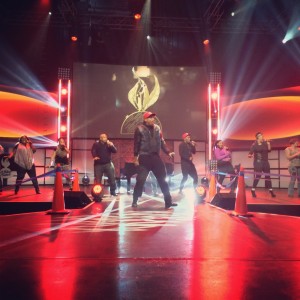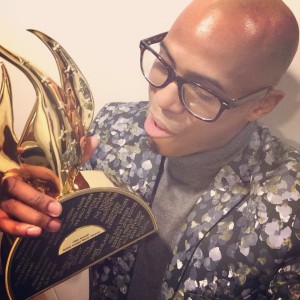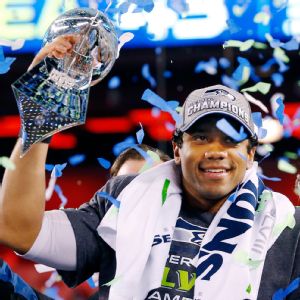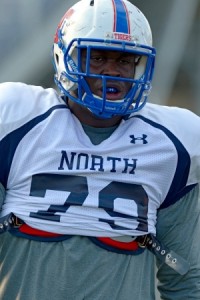Posted on February 22nd, 2014

Anthony Brown & group therAPy rehearsing for the Stellar Awards in January.
By DERON SNYDER
Anthony Brown has a vivid memory of singing in his parents’ church when he was 5 years old. Wearing a blazer, short pants and knee-high socks, he stood on a chair alongside his brother. That’s when he began watching the Stellar Awards, being blown away by the gospel artists he loved so much.
Fast forward to January 2014. Many of those same artists were blown away as Anthony Brown & group therAPy performed Testimony, their smash hit that was Billboard’s No. 1 gospel song in 2013. Onlookers would be shocked to learn that he created the choreography and re-arranged the song just days earlier.
“I spent two months trying to figure out what I was going to do, says Brown, who won Stellars for Contemporary Male Artist as well as Group/Duo of the Year. “Meanwhile, I had the Christmas play at church and I couldn’t focus. The producers kept calling and asking what I was going to do. I didn’t have a clue.”
But God showed up and showed out, which was the case throughout an incredible 2013 for Brown. The showers of blessings actually started in October 2012, when he got a call to join Mary Mary’s “Go Get It” tour. “From that moment on it’s been a mind-blowing experience,” says Brown, whose performances also included BET’s “Celebration of Gospel,” the Essence Music Festival and TBN’s “Praise the Lord” show. “The Bible says your gift will make room for you and bring you before great men. That’s exactly what I saw happen in my life.”
With calls coming in virtually every weekend with inviations to minister here and there, he couldn’t meet the demand. “I even got a call from BET’s ‘Sunday Best’ and had to turn it down because I was already engaged somewhere else.”
Brown got a chance to see how far his music extended – and how big God is – when he was nominated for a Dove Award. Those awards focus predominantly on contemporary Christian music, a field that doesn’t feature many African Americans. Attending that awards show in October 2013 helped open his eyes wider.
“If your only experience is the black church, you’re only getting a sliver of God’s influence,” Brown says. “I was rubbing elbows and talking to Pastor Rick Warren and other CCM artists, big names who sell out auditoriums and stadiums singing about Jesus Christ.
“It just gave me a reference point for how big and broad God is. We want to make this music thing so people from every race and every style can learn about who God is and be encouraged by this music,” he says.
 Plenty of folks were encouraged by Testimony, which Brown jokingly calls “the song that wouldn’t die.” Released in May 2012, it spent the vast majority of 2013 in the Top 10. “Artists wait a lifetime to get a song that lives like that,” Brown says. “You certainly don’t expect it on your first effort.”
Plenty of folks were encouraged by Testimony, which Brown jokingly calls “the song that wouldn’t die.” Released in May 2012, it spent the vast majority of 2013 in the Top 10. “Artists wait a lifetime to get a song that lives like that,” Brown says. “You certainly don’t expect it on your first effort.”
Brown would love some airplay for a few other songs on the group’s self-titled album. He wanted to perform a different song for the Stellars, but the producers insisted. Instead of moving on to one of the other 11 songs on the project, radio stations have asked for the Stellars’ re-mix version. “They will not let Testimony go,” he says.
He understands there are no guarantees in the recording industry. Artists put out projects all the time and most enjoy limited exposure – at best. Brown knew he had a tremendous support system in First Baptist Church of Glenarden (Md.) – where he serves as Assistant Minister of Music – and Pastor John K. Jenkins Sr. But Brown had no idea of the incredible blessings ahead.
“When I saw this music reaching out to people I don’t know, that’s when I was aware of God’s presence with that project,” he says. “God’s wind was on that. It was nothing that I could do on my own. I’m aware of His presence and I’m really grateful for it.”
Posted on February 9th, 2014
 By DERON SNYDER
By DERON SNYDER
As part of a men’s discipleship class at my church, I embarked on a 21-day Daniel Fast last month. It was an incredible experience for me and – judging by their testimonies – my fellow Brothers In Discipleship brothers.
My previous experiences with fasting were mostly along the lines of not eating prior to 6 p.m. As I listened to brothers who had done the Daniel Fast and I read handouts on it, doubts arose in my mind. I was uncertain about my ability to complete it in the manner I heard others describe.
My facilitator and assistant facilitator told our class what an amazing 21 days it would. They said we wouldn’t believe how good we felt, how much energy we had or how clear our minds would seem. They said there’d be some tough moments but, overall, we’d complete the fast with relative ease as long as we increased our time with God through prayer, studying His Word and meditation.
That sounded great. But in my mind I was thinking, “Yeah, right. They’re just trying to pump us up.” I decided from the start that I wouldn’t participate fully with the “no meats, no sweets, no TV” gameplan. I cut out all TV except the NFL playoffs. (To balance it out, I gave up listening to any music, news or talk shows while driving, no small sacrifice in itself.)
Three weeks later, I couldn’t believe what had happened.
Shawn and Darryl were absolutely correct in their prediction. I sustained myself on fruits, vegetables and nuts and it was OK! Even more amazing, I didn’t feel famished or weak. I felt strong and sharp. I read more, prayed more and meditated more. I replaced physical nourishment with spiritual nourishment and kept it moving!
I don’t want to say it was easy, but it felt easy. I kept thinking that wouldn’t last. I thought the level of difficulty would ramp up sooner or later, and I’d be a miserable, dragging, starving child of God. I was expecting it to grow more challenging as it went on and, frankly, I was surprised that it didn’t.
Maybe it was the novelty of it and it’ll be more of a test in years to come. Maybe one year I’ll have a freak-out moment about halfway through the fast – like Shawn shared with us – and feel like I can’t go on without eating “real” food. Maybe I’ll slip up.
But like the Scriptures, there’s enough to concern myself with today without looking ahead for possible concerns tomorrow!
Going through the fast reminded me that God is in control and, through Him, I have more control than I think. It was a wonderful, awesome, encouraging, inspiring and instructive experience. As an added bonus, I lost 15 pounds. Praise be to God!
Posted on February 4th, 2014
 By HOWARD MANN
By HOWARD MANN
Unlike the first African-American quarterback to win a Super Bowl, Seattle Seahawks QB Russell Wilson didn’t post eye-popping stats in his triumph.
Washington’s Doug Williams threw for four touchdown and a Super Bowl-record 340 yards when he led his team past John Elway’s Denver Broncos. Wilson’s numbers were much more modest Sunday night – two touchdowns and 340 yards – in leading his team past Peyton Manning’s Denver Broncos.
Williams is part of HBCU football royalty, a former Grambling State star who played for legendary coach Eddie Robinson. Wilson played his college ball at North Carolina State and Wisconsin.
But he has strong ties to HBCUs beneath the surface.
Wilson’s grandfather Harrison B. Wilson graduated from Kentucky State, was a highly-successful basketball coach at Jackson State and later became president of Norfolk State. Russell’s grandmother Dr. Lucy Wilson graduated from South Carolina State.
A great-great grandmother, Elizabeth “Bettie” Price Ayers, graduated from Wilberforce University in 1901. An aunt, April Woodard, is a professor at Hampton University.
His connection to the past wasn’t lost after the game.
“It’s something I think about, to be the second African-American to win the Super Bowl,” he said. “That’s history right there, man. It’s something special and it’s real.”
Wilson’s father died of complications from diabetes in 2010. But the belief he instilled in his son lives on, which helps explain how a 5-foot-11 quarterback can win the Super Bowl in his second NFL season.
“He always used to tap me and say, ‘Russ, why not you? Why not us.’”
That’s the question, indeed.
Whether we’re products of HBCUs, PWCUs or no CUs…
Why not us?
Posted on February 1st, 2014

Kadeem Edwards
By HOWARD MANN
There’s no denying that African Americans have come a long way since the days of Jim Crow. There’s also no doubt that integration helped lead to the gradual weakening of once-burgeoning black businesses and institutions.
Take HBCU football, for instance. The game used to bethe main attraction, with talents such as Jerry Rice (Mississippi Valley State), Bob Hayes (FAMU), Walter Payton (Jackson State), Willie Lanier (Morgan State), etc. But nowadays, the vast majority of NFL-caliber prospects go elsewhere for college ball, leaving HBCUs better known for bands and halftime rather than stars and highlights.
“The HBCU halftime is part of the culture, and I love the bands,” Tennessee State’s Kadeem Edwards told Aljazeera America. “It fills me with pride. But, man, the football is more important to me. I don’t want the people to leave the game before the third quarter. Stay and watch us.”
Edwards was the only HBCU player selected for the 2014 Senior Bowl. He believes that HBCU football “is slowly dying” with diminishing crowds and fewer impactful recruits. South Carolina State safety Christian Thompson was the only HBCU player drafted in 2012 and only two HBCU players were drafted last year; as recently as 1996, 17 were drafted.
Former Arizona Cardinals star Aeneas Williams, who played at Southern, said mid-major schools and up-and-coming FBS schools have dented the influx as much as traditional powerhouses such as Alabama, Texas, Florida State, etc. He said HBCUs need to do a better job of marketing and promoting their legacy (while also upgrading their facilities).
“We need to be blowing the horns for our players who have the skill set to play at the next level,” he said. “Football can be the eyes for people to see into your university.”
Clearly, there’s no going back to the glory days, but there’s no reason HBCU football can’t be a quality product.
A number of players will continue to transfer from FCS schools, for a variety of reasons. And while former Tennessee State cornerback Dominique Rodgers-Cromartie – who will line up for Denver in the Super Bowl – is the only first-round draft pick in the NFL, other HBCU players have reached the league via the undrafted free agent route.
It’s understandable that Edwards is frustrated by fans who barely pay attention during the game and leave after halftime. But continuing to compete is the best way to change that behavior.
Complaining isn’t the answer.
 Plenty of folks were encouraged by Testimony, which Brown jokingly calls “the song that wouldn’t die.” Released in May 2012, it spent the vast majority of 2013 in the Top 10. “Artists wait a lifetime to get a song that lives like that,” Brown says. “You certainly don’t expect it on your first effort.”
Plenty of folks were encouraged by Testimony, which Brown jokingly calls “the song that wouldn’t die.” Released in May 2012, it spent the vast majority of 2013 in the Top 10. “Artists wait a lifetime to get a song that lives like that,” Brown says. “You certainly don’t expect it on your first effort.” Follow
Follow




